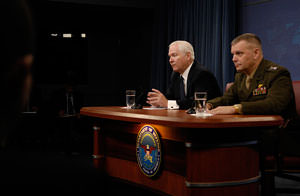General Passed Over for Giving Obama Advice
President Obama nominated Gen Martin Dempsey on Monday to take over as chairman of the Joint Chiefs of Staff, the top military adviser to the president Obama's first choice for the job, according to The Washington Post, was Marine Gen James Cartwright, who was reportedly denied the promotion for (more).
President Obama nominated Gen. Martin Dempsey on Monday to take over as chairman of the Joint Chiefs of Staff, the top military adviser to the president. Obama’s first choice for the job, according to The Washington Post, was Marine Gen. James Cartwright, who was reportedly denied the promotion for giving his own assessment of the war in Afghanistan.
The article portrays the president as an awkward fit with military leaders and describes Cartwright as one of Obama’s “favorite and most trusted military advisers.” On several occasions, the paper reports, Obama told Cartwright, who is currently vice chairman of the Chiefs, the job was as much as his. And why not? The chairman is supposed to be the president’s most trusted military adviser. Shouldn’t that person be someone the president trusts?
Apparently politics and hurt feelings took precedent. Here is the key section from the Post story:
During the White House’s strategy review of the Afghan war in 2009, [current Joint Chiefs Chair Adm. Mike] Mullen, [Defense Secretary Robert] Gates and [Gen. David] Petraeus all backed an option to deploy 40,000 more troops. Obama was leery and pressed Cartwright on whether he thought it was the right approach. In response, Cartwright presented an alternative plan to send half as many extra troops.
“He was very aware he was providing guidance that was not in alignment” with the rest of the Pentagon, said a military officer close to Cartwright who spoke on the condition of anonymity to discuss internal deliberations with the White House. But Cartwright felt compelled to give an independent assessment to the president, even if it risked alienating Gates and Mullen, the military officer said. “He was told [by Obama], ‘No, don’t just give me the old line, Hoss. Give me your opinion.’ ”
It seems Gates and Mullen, both of whom were appointed by George W. Bush and are retiring soon, have a lot of pull in the administration.
There are other complicating factors. The chairman of the Joint Chiefs needs to be confirmed by the Senate and the White House may have felt Cartwright’s nomination would have been a tougher fight to win. And, of course, this is all speculation based on unnamed sources. For all we know, Obama was never interested in the man, or the facts of the situation changed behind closed doors.
But the image of Obama’s top military and foreign policy advisers limiting his options to such a narrow field — and punishing those who go off-message — squares with our understanding of this presidency.
Here is William Pfaff in a 2010 column on the subject:
When Barack Obama was elected president with a pledge to fight the “right war” in Afghanistan, he undoubtedly expected Defense Secretary Robert Gates to set out a range of options from negotiations with the Taliban to nuclear war, with comprehensive analyses. Instead it would seem he was presented one plan, already in operation, of troop “surge” as in Iraq, to be followed by “counterinsurgency” as set forth by the general commanding, David Petraeus—heavily publicized as a dramatic new war-winning strategy.
Obama’s decision for our future military involvement in Afghanistan was always a choice of how many troops to send, not whether to send them at all or bring them home.
Regardless, it’s bizarre to think that the controversy that reportedly cost Cartwright a promotion was the general’s willingness to come up with a plan that sent only an additional 20,000 troops to an irrational war. Happy Memorial Day. — PZS
Your support matters…Independent journalism is under threat and overshadowed by heavily funded mainstream media.
You can help level the playing field. Become a member.
Your tax-deductible contribution keeps us digging beneath the headlines to give you thought-provoking, investigative reporting and analysis that unearths what's really happening- without compromise.
Give today to support our courageous, independent journalists.






You need to be a supporter to comment.
There are currently no responses to this article.
Be the first to respond.